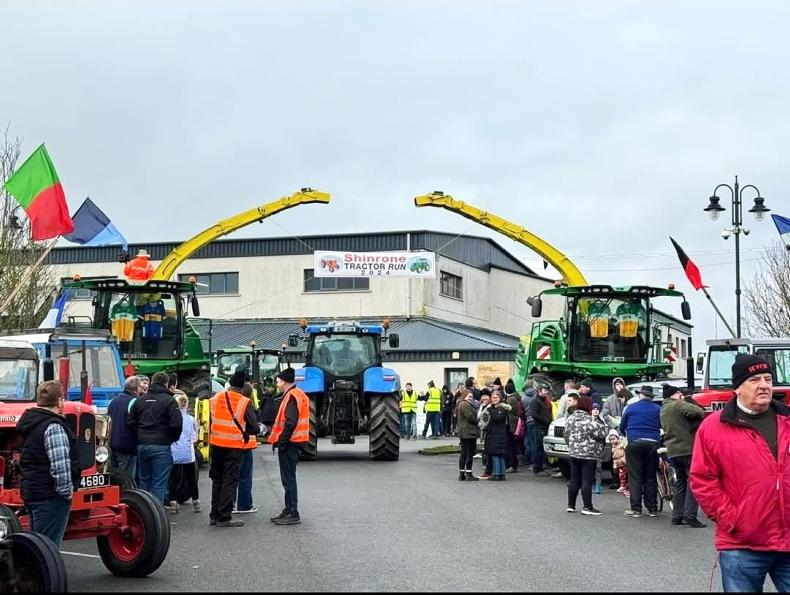A commitment by the newly installed coalition Government to ‘continue to support one-off rural housing’, which is included in the Programme for Government, will be of little reassurance to the people who are being denied permission to build homes on their own land.
Frustration with a planning system that has been deemed inconsistent and unfair by those who have navigated its many levels, at a cost of thousands of euros, has been experienced the length and breath of the country, with little uniformity in policies across local authorities.
As the country continues to languish in a housing crisis and Government figures show its own targets of new home delivery fell short in 2024. All efforts seem focused on providing housing developments in urban areas with little progress made on making it easier for people in rural Ireland to build their own homes.
Rural Housing Planning guidelines, which date back to 2005, are in the process of being updated, but there is, as yet, no date for the publication of new rules.
The Government has admitted that there must be a recognition of the distinct needs and opportunities of rural Ireland and that this must be at the heart of decision making when it comes to planning. Yet, anyone who has been refused planning will tell you that their needs are not being recognised when it comes to affording them the opportunity to build their own home.
Residency requirement
Local authorities base their planning policies on their individual County Development Plans, which are unique to that county or administrative area. While these plans are guided by the National Planning Framework, published in 2018, their interpretation and implementation is at the discretion of the council executive, namely the planning department.
For example, in Co Meath a person seeking planning for a one-off rural home must be a resident in the area for a minimum of five years and reside within 12km of the site proposed for development. In Galway, the residency requirement is a minimum of seven years and the applicant must have lived within 8km of the proposed site, for a substantial, continuous part of their life.
The need to prove you are intrinsic to the community seems to be a uniform requirement, regardless of the fine print, but even where it can be shown that a person has grown up in an area and has family land to build on, applications are being refused.
Housing Minister
Irish Country Living has spoken to people all over the country to hear their experiences of the planning system. Our requests for interview to several local authorities have been declined.
This is despite the fact that An Taoiseach, Micheál Martin, acknowledged the crisis facing farming families, who are being prevented from building homes on their land, in the run up to last November’s general election, saying sons and daughters of farmers should be able to do so.
Over the coming weeks we will look at the issues facing landowners trying to build homes in rural Ireland. We will continue to lobby local authorities for comment on how planning decisions are determined and we hope to speak with the newly appointed Housing Minister James Browne to get answers on why those who have land and can prove a housing need are not being allowed to build.

The newly appointed Minister for Housing, James Browne.
The issue of rural housing has been raised at national political level many times in recent years, with several TDs calling on the last administration’s Housing Minister Darragh O’Brien to clarify when updated rural housing guidelines will be published.
In all responses, Minister O’Brien cited the National Planning Framework’s (NPF) policy objectives as being clear on the matter. In particular, he referenced the National Policy Objective. This states that in areas under urban influence within the commuter catchment of cities and large towns and centres of employment, single housing in the countryside should be facilitated.
This is based on the core consideration of demonstrable economic or social need to live in a rural area, along with meeting the siting and design criteria for rural housing in statutory guidelines and plans.
In rural areas elsewhere, the NPF states single housing in the countryside should be facilitated based on siting and design criteria for rural housing in statutory guidelines and plans, having regard to the viability of smaller towns and rural settlement.
Nonetheless, planning applications are being delayed or refused countrywide, on land which already accommodates farmhouses but is now deemed unsuitable for the children of these families to build their own homes.
One of the biggest hurdles for many to clear, is the impact new rural houses have on road safety, with sight lines a consistent impediment for anyone looking to build adjacent to a national or regional road.
However, Transport Infrastructure Ireland (TII), the body responsible for maintaining the national and regional road network, appeals less than 1% of the planning applications it is consulted on.
Guidelines review
The Programme for Government has committed to a review of the planning and transport guidelines for national secondary roads to facilitate housing, community and industrial development, but no timeline has been agreed for delivery.
Other reasons planning applications are refused include design issues, where the proposed building is not in keeping with the local landscape or environmental considerations, as much of rural Ireland is designated a special area of conservation.
The frustration of those living in these areas is compounded by the fact that people who are not local to the community are being granted planning to demolish derelict houses and build new structures – which are not in keeping with the original dwelling – without any difficulty.
The current impasse for farming families seeking to build their own home flies in the face of a recommendation issued over 25 years ago in a government White Paper on Rural Development that stated the future of rural society was based on the maintenance of dispersed, vibrant rural communities.
This paper recommended that planning policy should as far as possible ‘facilitate people willing to settle in rural areas, particularly those willing to settle in their own areas of origin’.
Many prospective homeowners in rural Ireland would like to see this basic principle prioritised in any new regulations due from government.
A commitment by the newly installed coalition Government to ‘continue to support one-off rural housing’, which is included in the Programme for Government, will be of little reassurance to the people who are being denied permission to build homes on their own land.
Frustration with a planning system that has been deemed inconsistent and unfair by those who have navigated its many levels, at a cost of thousands of euros, has been experienced the length and breath of the country, with little uniformity in policies across local authorities.
As the country continues to languish in a housing crisis and Government figures show its own targets of new home delivery fell short in 2024. All efforts seem focused on providing housing developments in urban areas with little progress made on making it easier for people in rural Ireland to build their own homes.
Rural Housing Planning guidelines, which date back to 2005, are in the process of being updated, but there is, as yet, no date for the publication of new rules.
The Government has admitted that there must be a recognition of the distinct needs and opportunities of rural Ireland and that this must be at the heart of decision making when it comes to planning. Yet, anyone who has been refused planning will tell you that their needs are not being recognised when it comes to affording them the opportunity to build their own home.
Residency requirement
Local authorities base their planning policies on their individual County Development Plans, which are unique to that county or administrative area. While these plans are guided by the National Planning Framework, published in 2018, their interpretation and implementation is at the discretion of the council executive, namely the planning department.
For example, in Co Meath a person seeking planning for a one-off rural home must be a resident in the area for a minimum of five years and reside within 12km of the site proposed for development. In Galway, the residency requirement is a minimum of seven years and the applicant must have lived within 8km of the proposed site, for a substantial, continuous part of their life.
The need to prove you are intrinsic to the community seems to be a uniform requirement, regardless of the fine print, but even where it can be shown that a person has grown up in an area and has family land to build on, applications are being refused.
Housing Minister
Irish Country Living has spoken to people all over the country to hear their experiences of the planning system. Our requests for interview to several local authorities have been declined.
This is despite the fact that An Taoiseach, Micheál Martin, acknowledged the crisis facing farming families, who are being prevented from building homes on their land, in the run up to last November’s general election, saying sons and daughters of farmers should be able to do so.
Over the coming weeks we will look at the issues facing landowners trying to build homes in rural Ireland. We will continue to lobby local authorities for comment on how planning decisions are determined and we hope to speak with the newly appointed Housing Minister James Browne to get answers on why those who have land and can prove a housing need are not being allowed to build.

The newly appointed Minister for Housing, James Browne.
The issue of rural housing has been raised at national political level many times in recent years, with several TDs calling on the last administration’s Housing Minister Darragh O’Brien to clarify when updated rural housing guidelines will be published.
In all responses, Minister O’Brien cited the National Planning Framework’s (NPF) policy objectives as being clear on the matter. In particular, he referenced the National Policy Objective. This states that in areas under urban influence within the commuter catchment of cities and large towns and centres of employment, single housing in the countryside should be facilitated.
This is based on the core consideration of demonstrable economic or social need to live in a rural area, along with meeting the siting and design criteria for rural housing in statutory guidelines and plans.
In rural areas elsewhere, the NPF states single housing in the countryside should be facilitated based on siting and design criteria for rural housing in statutory guidelines and plans, having regard to the viability of smaller towns and rural settlement.
Nonetheless, planning applications are being delayed or refused countrywide, on land which already accommodates farmhouses but is now deemed unsuitable for the children of these families to build their own homes.
One of the biggest hurdles for many to clear, is the impact new rural houses have on road safety, with sight lines a consistent impediment for anyone looking to build adjacent to a national or regional road.
However, Transport Infrastructure Ireland (TII), the body responsible for maintaining the national and regional road network, appeals less than 1% of the planning applications it is consulted on.
Guidelines review
The Programme for Government has committed to a review of the planning and transport guidelines for national secondary roads to facilitate housing, community and industrial development, but no timeline has been agreed for delivery.
Other reasons planning applications are refused include design issues, where the proposed building is not in keeping with the local landscape or environmental considerations, as much of rural Ireland is designated a special area of conservation.
The frustration of those living in these areas is compounded by the fact that people who are not local to the community are being granted planning to demolish derelict houses and build new structures – which are not in keeping with the original dwelling – without any difficulty.
The current impasse for farming families seeking to build their own home flies in the face of a recommendation issued over 25 years ago in a government White Paper on Rural Development that stated the future of rural society was based on the maintenance of dispersed, vibrant rural communities.
This paper recommended that planning policy should as far as possible ‘facilitate people willing to settle in rural areas, particularly those willing to settle in their own areas of origin’.
Many prospective homeowners in rural Ireland would like to see this basic principle prioritised in any new regulations due from government.











SHARING OPTIONS